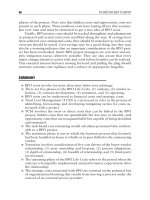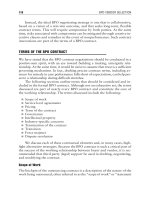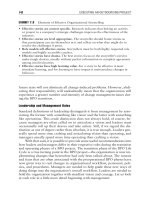Lecture Judgment in managerial decision making (8e) - Chapter 10: Making rational decisions in negotiations
Bạn đang xem bản rút gọn của tài liệu. Xem và tải ngay bản đầy đủ của tài liệu tại đây (139.24 KB, 9 trang )
Judgment in Managerial Decision
Making 8e
Chapter 10
Making Rational Decisions in
Negotiations
Copyright 2013 John Wiley &
Sons
Game Theoretic Approaches
•
Provides precise prescriptive advice
•
Relies on describing all outcomes
•
Assumes all parties are rational
A Decision-Analytic Approach to
Negotiation
•
•
•
Describes the behavior of counterparts
Prescribes advice from counterpart
behavior
Analytical framework
–
Alternatives to negotiated agreement
–
Each party’s set of interests
–
Relative important of interests
Alternative to a Negotiated
Agreement
•
Best Alternative to Negotiated Agreement
•
Reservation point
•
Many accept offers below BATNA
The Interests of the Parties
•
Identifying counterpart interests is key
•
Focusing on deeper interests
•
Understanding the importance of issues
Claiming Value in Negotiation
A new MBA is being recruited for a highly
specialized position. The organization and
the employee have agreed on all issues
except salary. The organization has offered
$90,000, and the employee has
counteroffered $100,000. Both sides believe
they have made fair offers, but they both
would very much like to reach an
agreement. The student, while not
verbalizing this infor-mation, would be willing
Creating Value in Negotiation
•
Many negotiations involve multiple issues
•
Value creation
–
1978 Camp David Accords
–
Trading on issues to create value
–
Creating value through bets
•
Build on differences
•
Mange biases
•
Diagnose disingenuous parties
•
Establish performance incentives
The Tools of Value Creation
•
Build trust and share information
•
Ask questions
•
Strategically disclose information
•
Negotiate multiple issues simultaneously
•
Make multiple offers simultaneously
•
Search for post-settlement settlements
Key Preparation Questions
•
What is your BATNA?
•
What are the issues?
•
How important is each issue?
•
What is your counterpart’s BATNA?
•
Are there value creation opportunities?
•
Is there disagreement about predictions?
•
How will you obtain information?









